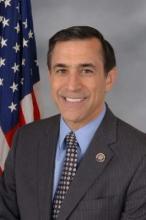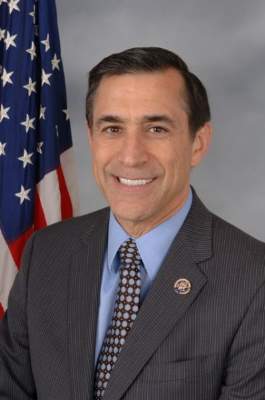User login
WASHINGTON – Both Republicans and Democrats on the House Oversight and Government Reform committee said they believed the Centers for Disease Control and Prevention had not been acting quickly or consistently enough to protect health care workers and Americans from the Ebola virus.
Committee Chairman Darrell Issa (R-Calif.) said he felt that the agency had made recommendations on protective equipment that turned out to be ill advised. He also suggested that CDC Director Thomas Frieden had misled the American public about the potential for transmission.
“We have the head of CDC – he’s supposed to be the expert – and he’s made statements that simply aren’t true,” Rep. Issa said at the hearing, adding that the two nurses who were infected at a Dallas hospital had been wearing protective gear recommended by the CDC. “We’re relying on protocols from somebody who has proven not to be correct,” he said.
He asked whether Congress should view the federal government’s Ebola response as not just a singular mistake, but potentially a failure in preparedness for any infectious disease epidemic.
“Our failures largely relate to the fact that we’re learning some new things about Ebola,” said Dr. Nicole Lurie, assistant secretary for preparedness and response at the U.S. Department of Health & Human Services. “Ebola has never been in this hemisphere before, and as we’re learning those things we’re tightening up our policies and procedures as quickly as possible,” said Dr. Lurie.
Rep. Gerald Connolly (D-Va.) said that he, too, wanted answers, noting that “while CDC was giving us assurances about how hard it was to contract the disease,” two nurses were infected. “Do you think perhaps, not intentionally of course, in a zeal to assure the public, CDC misstepped?” he asked.
“I think that CDC has said that some missteps have been made,” said Dr. Lurie.
She labeled the response effort “a work in progress,” adding, “we are taking constant steps to adjust.”
Meanwhile, National Nurses United told the committee that it is asking President Obama to order hospitals to adopt a mandatory uniform of protective clothing and gear to help prevent any further contamination of health care workers.
Deborah Burger, copresident of the nurses’ group, told the panel that hospitals are still unprepared to treat any potential Ebola patients. She cited a survey by the group that found that 85% of responding registered nurses said they had not been adequately trained. Almost 70% said their facility had not communicated any policy regarding the potential admission of an Ebola patient.
“Every [registered nurse] who works in a hospital or healthcare facility could be Nina Pham or Amber Vinson, both of whom contracted Ebola while treating Thomas Eric Duncan at Texas Health Presbyterian Hospital in Dallas,” said Ms. Burger.
She noted that even though the CDC had recently updated its guidelines on what health care workers should wear when treating Ebola patients, those guidelines are “just guidelines.”
Ms. Burger added, “all 5,000 hospitals in the U.S.A. get to pick and choose what part of the guidelines they want to implement,” which is why her group was seeking a mandate for protective clothing and gear.
WASHINGTON – Both Republicans and Democrats on the House Oversight and Government Reform committee said they believed the Centers for Disease Control and Prevention had not been acting quickly or consistently enough to protect health care workers and Americans from the Ebola virus.
Committee Chairman Darrell Issa (R-Calif.) said he felt that the agency had made recommendations on protective equipment that turned out to be ill advised. He also suggested that CDC Director Thomas Frieden had misled the American public about the potential for transmission.
“We have the head of CDC – he’s supposed to be the expert – and he’s made statements that simply aren’t true,” Rep. Issa said at the hearing, adding that the two nurses who were infected at a Dallas hospital had been wearing protective gear recommended by the CDC. “We’re relying on protocols from somebody who has proven not to be correct,” he said.
He asked whether Congress should view the federal government’s Ebola response as not just a singular mistake, but potentially a failure in preparedness for any infectious disease epidemic.
“Our failures largely relate to the fact that we’re learning some new things about Ebola,” said Dr. Nicole Lurie, assistant secretary for preparedness and response at the U.S. Department of Health & Human Services. “Ebola has never been in this hemisphere before, and as we’re learning those things we’re tightening up our policies and procedures as quickly as possible,” said Dr. Lurie.
Rep. Gerald Connolly (D-Va.) said that he, too, wanted answers, noting that “while CDC was giving us assurances about how hard it was to contract the disease,” two nurses were infected. “Do you think perhaps, not intentionally of course, in a zeal to assure the public, CDC misstepped?” he asked.
“I think that CDC has said that some missteps have been made,” said Dr. Lurie.
She labeled the response effort “a work in progress,” adding, “we are taking constant steps to adjust.”
Meanwhile, National Nurses United told the committee that it is asking President Obama to order hospitals to adopt a mandatory uniform of protective clothing and gear to help prevent any further contamination of health care workers.
Deborah Burger, copresident of the nurses’ group, told the panel that hospitals are still unprepared to treat any potential Ebola patients. She cited a survey by the group that found that 85% of responding registered nurses said they had not been adequately trained. Almost 70% said their facility had not communicated any policy regarding the potential admission of an Ebola patient.
“Every [registered nurse] who works in a hospital or healthcare facility could be Nina Pham or Amber Vinson, both of whom contracted Ebola while treating Thomas Eric Duncan at Texas Health Presbyterian Hospital in Dallas,” said Ms. Burger.
She noted that even though the CDC had recently updated its guidelines on what health care workers should wear when treating Ebola patients, those guidelines are “just guidelines.”
Ms. Burger added, “all 5,000 hospitals in the U.S.A. get to pick and choose what part of the guidelines they want to implement,” which is why her group was seeking a mandate for protective clothing and gear.
WASHINGTON – Both Republicans and Democrats on the House Oversight and Government Reform committee said they believed the Centers for Disease Control and Prevention had not been acting quickly or consistently enough to protect health care workers and Americans from the Ebola virus.
Committee Chairman Darrell Issa (R-Calif.) said he felt that the agency had made recommendations on protective equipment that turned out to be ill advised. He also suggested that CDC Director Thomas Frieden had misled the American public about the potential for transmission.
“We have the head of CDC – he’s supposed to be the expert – and he’s made statements that simply aren’t true,” Rep. Issa said at the hearing, adding that the two nurses who were infected at a Dallas hospital had been wearing protective gear recommended by the CDC. “We’re relying on protocols from somebody who has proven not to be correct,” he said.
He asked whether Congress should view the federal government’s Ebola response as not just a singular mistake, but potentially a failure in preparedness for any infectious disease epidemic.
“Our failures largely relate to the fact that we’re learning some new things about Ebola,” said Dr. Nicole Lurie, assistant secretary for preparedness and response at the U.S. Department of Health & Human Services. “Ebola has never been in this hemisphere before, and as we’re learning those things we’re tightening up our policies and procedures as quickly as possible,” said Dr. Lurie.
Rep. Gerald Connolly (D-Va.) said that he, too, wanted answers, noting that “while CDC was giving us assurances about how hard it was to contract the disease,” two nurses were infected. “Do you think perhaps, not intentionally of course, in a zeal to assure the public, CDC misstepped?” he asked.
“I think that CDC has said that some missteps have been made,” said Dr. Lurie.
She labeled the response effort “a work in progress,” adding, “we are taking constant steps to adjust.”
Meanwhile, National Nurses United told the committee that it is asking President Obama to order hospitals to adopt a mandatory uniform of protective clothing and gear to help prevent any further contamination of health care workers.
Deborah Burger, copresident of the nurses’ group, told the panel that hospitals are still unprepared to treat any potential Ebola patients. She cited a survey by the group that found that 85% of responding registered nurses said they had not been adequately trained. Almost 70% said their facility had not communicated any policy regarding the potential admission of an Ebola patient.
“Every [registered nurse] who works in a hospital or healthcare facility could be Nina Pham or Amber Vinson, both of whom contracted Ebola while treating Thomas Eric Duncan at Texas Health Presbyterian Hospital in Dallas,” said Ms. Burger.
She noted that even though the CDC had recently updated its guidelines on what health care workers should wear when treating Ebola patients, those guidelines are “just guidelines.”
Ms. Burger added, “all 5,000 hospitals in the U.S.A. get to pick and choose what part of the guidelines they want to implement,” which is why her group was seeking a mandate for protective clothing and gear.
AT THE HOUSE OVERSIGHT COMMITTEE

